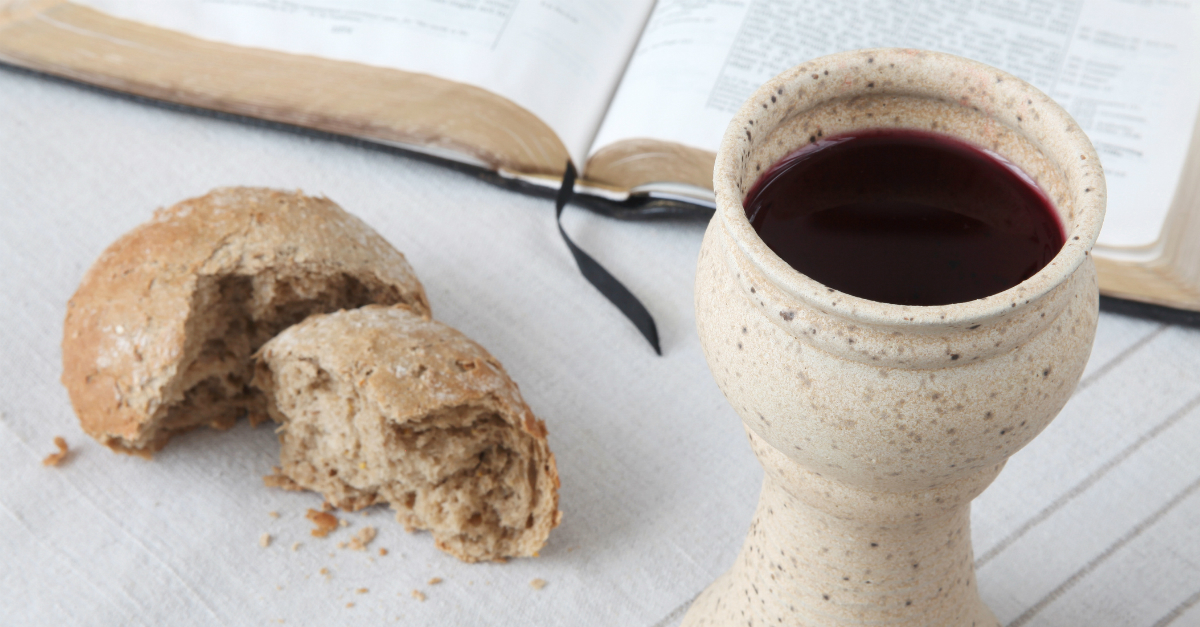The Magnificent Truth in the Command “Do This in Remembrance of Me”

In the church where I grew up, in the front of the room, right below the pulpit was a table with the words “Do this in remembrance of me” inscribed. I distinctly remember this and have seen it written out in some form in many churches since then. Why do these words hold such a prominent position in our faith?
Remembrance is an important aspect of Christianity. As believers we are encouraged and strengthened by remembering the faith and deeds of those who have gone before us. We remember that ours is an ancient faith, we remember the promises of God’s word, and as we do so our confidence is built in trusting God and living in his truth.
There are several places in Scripture where we are encouraged to remember, but the commandment from Jesus spoken on the night he was betrayed stands out from the rest. There is a deep and vibrant meaning to this instruction, and this remembrance continues to be a cornerstone of our faith.
The Origin of Remembrance and Its Fulfillment
“And he took bread, gave thanks and broke it, and gave it to them, saying, ‘This is my body given for you; do this in remembrance of me.’ In the same way, after the supper he took the cup, saying, ‘This cup is the new covenant in my blood, which is poured out for you’” (Luke 22:19-20).
Events in the Old Testament often serve the dual purpose of fulfilling God’s promises to his people in the moment, while also providing a view of what is to come. This occurrence is one of the most obvious of these, as Jesus fulfills the meaning of Passover.
This verse takes place within the context of the Last Supper Jesus had with his disciples. This meal was a part of the Jewish festival of Passover, which had been observed annually since Moses led the people of Israel out of Egypt. The original Passover was a miraculous occurrence, and the pivotal event in the formation of God’s people as a nation. After having been enslaved in Egypt for centuries, this represented the night that their tormentors were punished and the Israelites were freed from slavery according to God’s promise of restoration. The account from Exodus 12:12-14 describes what happened:
“On that same night I will pass through Egypt and strike down every firstborn of both people and animals, and I will bring judgment on all the gods of Egypt. I am the Lord. The blood will be a sign for you on the houses where you are, and when I see the blood, I will pass over you. No destructive plague will touch you when I strike Egypt. This is a day you are to commemorate; for the generations to come you shall celebrate it as a festival to the Lord—a lasting ordinance.”
The Jewish people had observed this meal every year in order to remember God’s fulfillment of his promise. Every year they reenacted the preparation of fleeing Egypt, and being prepared for whatever came next. Jesus takes this concept to its completion as he reveals that he is the true fulfillment of the Passover.
Here we see Jesus commemorating, observing, and remembering what God has done while simultaneously revealing what God is doing and will do. Just as the blood of the lamb covered the doorposts, the blood of Jesus covers our sins. The disciples would certainly observe this meal again, as would the entire nation of Israel and the church to come, but Jesus is now adding a deeper meaning to it. As we remember freedom from physical slavery, we also remember the sacrifice of Jesus that frees us from spiritual slavery.

Photo credit: ©Getty Images/IngridHS
Is Luke the Only Gospel That Includes This Phrase?
For such an important command spoken by Jesus, we might imagine that it would be recorded in all four Gospels. Yet, this is not the case, and the phrase “Do this in remembrance of me” is only found in Luke’s Gospel. Does this give it less significance? Not at all!
It is clear from Paul’s writings later on that this phrase was well known and well understood within the church. Paul repeats it verbatim in 1 Corinthians 11:23-26:
“For I received from the Lord what I also passed on to you: The Lord Jesus, on the night he was betrayed, took bread, and when he had given thanks, he broke it and said, ‘This is my body, which is for you; do this in remembrance of me.’ In the same way, after supper he took the cup, saying, ‘This cup is the new covenant in my blood; do this, whenever you drink it, in remembrance of me.’ For whenever you eat this bread and drink this cup, you proclaim the Lord’s death until he comes.”
It is clear that these words of Jesus held significant importance and were cemented into the hearts and minds of the early Church.
How Can Christians Practice This Command Today?
The most obvious way we can practice this command is through doing what the Church has done for centuries: observing communion together regularly, prayerfully and thoughtfully considering together what the Lord has done for us.
In John 6:56, Jesus says something strange that makes no sense out of context: “Whoever eats my flesh and drinks my blood remains in me, and I in them.” In that moment, these words caused many to turn away from him, but we can now clearly see what he was referring to; the fulfillment of the Passover meal in his life, sacrifice and resurrection. As we observe Communion today, we are declaring ourselves to be in community with him and with one another.
In our immediate context, in this trying time of quarantine and pandemic, it seems nearly impossible to remember Jesus through communion as he instructed his disciples to do. In that way, we can be discouraged. However, we can’t assume Jesus didn’t foresee this! Regardless of our situation, we can faithfully remember his sacrifice for us daily in all of our thoughts, words, and deeds.
Photo credit: ©Getty Images/Suwaree Tangbovornpichet
Jason Soroski is a homeschool dad and member of the worship team at matthias lot church in St. Charles, MO. He spends his free time hanging out with his family, exploring new places, and writing about the experiences. Connect on Facebook or at JasonSoroski.net.
Originally published July 20, 2020.





